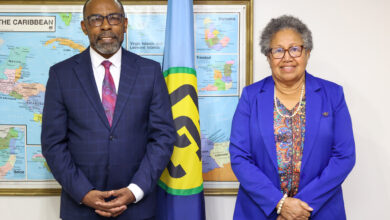(CARICOM Secretariat, Turkeyen, Georgetown Guyana) The Sixth Meeting of the Regional Committee of Directors of Youth Affairs opened in Georgetown, Guyana on Monday, 08 October, 2007 with a strong call from youth representatives for CARICOM Governments to heighten youth participation in governance issues; include the formative years of youth in the development of youth policies and to move beyond policy development to policy implementation.
The meeting was convened to review, among other things, progress towards the implementation of the Regional Strategy for Youth Development (RSYD) as well as the restructuring and strengthening of departments responsible for youth affairs. It precedes the opening of the Sixteenth Meeting of the Council for Human and Social Development (COHSOD XVI) on youth and culture development scheduled for 10 – 12 October; under the theme: Realising the Potential of Youth and Culture in the Development of the Community.
In setting the tone for the meeting, Dr Edward Greene, Assistant Secretary General, Human and Social Development in the CARICOM Secretariat gave an overview of the significance of the meeting, noting that it was convened at a time when “the Community was at a crossroads of some very important decisions to be made about the Youth Agenda.”
Dr Greene told the meeting that in order to address the challenges adequately and appropriately, there was an urgent need to ensure “an effective functioning youth programme within the context of the CARICOM Single Market and Economy.”
He added that there must be a recognition of the role of youth in the development of the youth agenda and participation in youth governance as “governance of youth programmes must of necessity include youth, if they are going to be sustainable.”
Dr Greene applauded the development of the RSYD but acknowledged that more strides needed to be made toward implementing this strategy. Outlining several challenges facing CARICOM youth, the Assistant Secretary General charged youth directors to devise workable strategies to curtail crime and gang violence among youth, and to assist in the creation of a nurturing and enabling environment for youth development in the Community.
Also speaking at the meeting, Mr Jeffrey Injumba, Regional HIV and AIDS Officer, United Nations Children Fund (UNICEF), underscored the importance of focusing on the early adolescent years (10-14 years) and the use of the Life Cycle Approach from 0 – 18 years in formulating policies for youth development.
He argued that very often some governments develop youth policies which do not speak to the realities of youth, while others institute excellent programmes which were not sustained because they were not rooted in policies. He advocated for a balance and for the involvement of youth in policy development, concluding that “we have got to look at young people while they are still young.”
Mr Injumba also called on the meeting to focus on the engaging and empowering unattached youth, as “they too had a right to development.”
The opening session closed with youth ambassadors and directors arriving at a consensus that the Community needed to address issues such as facilitating increased youth participation in governance; developing policies which were youth-centred; demystifying the concept of youth development; investing in the early adolescent years and recognizing, on a regional level, excellence in youth.
The meeting ends on Tuesday, 09 October. The results of deliberations from the two-day meeting will form part of the Report on Youth Development to be made at the COHSOD on 10 -12 October.




